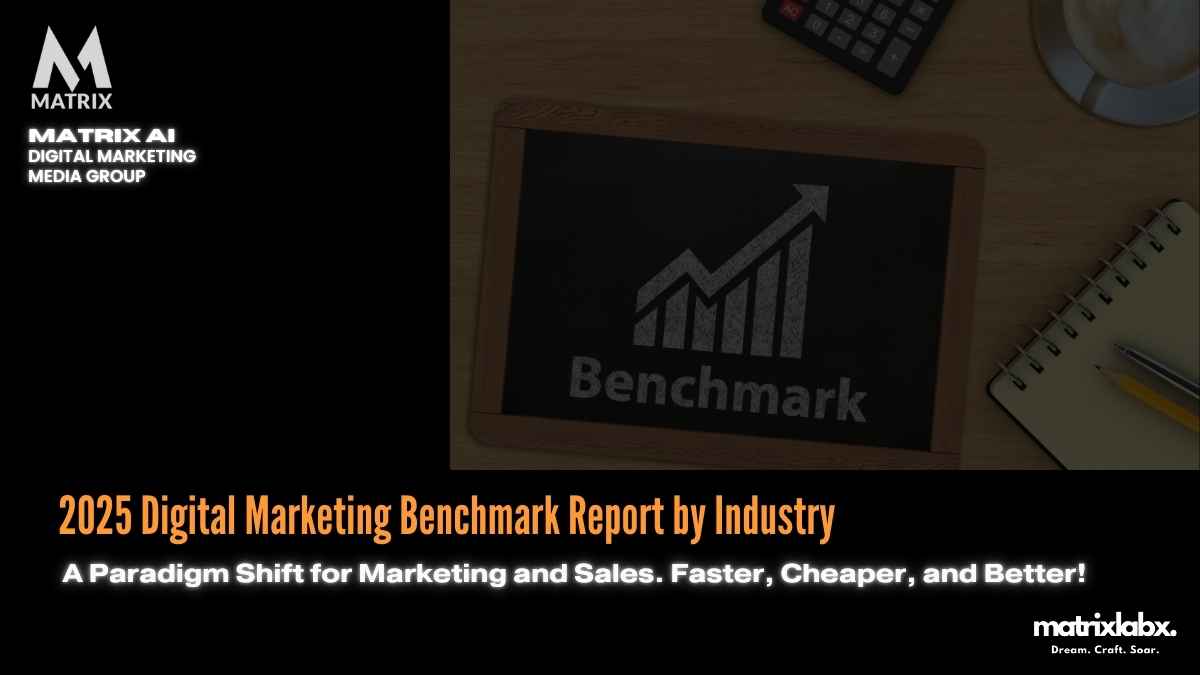Digital Marketing Benchmark Report by Industry for 2025
Learn About the Digital Marketing Benchmark Report by Industry for 2025.
Staying ahead requires a robust understanding of industry-specific digital marketing benchmarks in an ever-evolving digital landscape.
The 2025 Digital Marketing Benchmark Report examines key performance metrics (KPIs), emerging trends, and strategic insights that define successful campaigns across industries.
This guide will help businesses establish realistic goals, refine their strategies, and gain a competitive edge.
We are entering another phase with AI, and 2025 will bring our energized interns to life. These energized interns, whom we refer to as co-bots, work tirelessly and never complain. They do it faster, cheaper, and better than humans.
Clicks Don’t Close Deals. ROI Does.
Are you still guessing what your next marketing campaign will deliver?
At Matrix Marketing Group, we built the Marketing ROI & Funnel Projection Tool to eliminate the guesswork and bring financial precision to your marketing strategy.
Key Metrics for 2025
Return on Investment (ROI) from Thought Leadership SEO
Thought leadership SEO campaigns, which involve strategic planning and high-quality content creation, have demonstrated a return on advertising spend (ROAS) of 9.10, equating to a 748% ROI, with a typical break-even point at around 9 months. Review how to win with SEO Services.
The digital marketing landscape continues to evolve, and staying ahead requires a firm grasp of industry-specific benchmarks.
The Digital Marketing Benchmark Report by Industry for 2025 provides insights into key performance metrics, emerging trends, and strategic approaches that define successful campaigns across various sectors.
This guide empowers businesses to set realistic goals, optimize strategies, and gain a competitive edge in the rapidly changing digital landscape.
The following metrics are benchmarks across industries for digital marketing success:
| Metric | Description |
| Customer Acquisition Cost (CAC) | The cost of acquiring a new customer through digital channels. |
| Return on Investment (ROI) | The profitability ratio of marketing efforts. |
| Conversion Rate (CR) | Percentage of users who complete the desired action (e.g., purchase, sign-up). |
| Click-Through Rate (CTR) | Percentage of users clicking a link versus total impressions. |
| Cost Per Click (CPC) | The cost incurred for each click on a paid advertisement. |
| Social Media Engagement Rate | Percentage of interactions (likes, comments, shares) relative to total followers or reach. |
| Email Open Rate | Percentage of email recipients who open a given email. |
| Organic Traffic | Visitors from non-paid search results. |
Digital Marketing Benchmarks by Industry
Digital Marketing Benchmarks by Industry: Your Key to Success
Unlock the potential of your digital marketing campaigns with our comprehensive Digital Marketing Benchmark Report by Industry for 2025.
Is Your Marketing Stack Leaving Money on the Table?
Your disconnected tools see pieces of the puzzle. A unified AI platform sees the whole picture. Enter your metrics to quantify the impact of switching to MatrixLabX.
Your Current Metrics
Core Business Inputs
1. Searching
2. Streaming
3. Scrolling
4. Shopping
Your Performance Transformed
| Metric | Your Platform | MatrixLabX | Monthly Lift |
|---|
Total Estimated Annual Gain
$0
from improved conversions and recovered revenue
This data-driven guide provides invaluable insights into key performance metrics, emerging trends, and industry best practices.
Empower your business with the following benefits:
- Stay Ahead of the Curve: Gain a competitive edge by aligning your strategies with industry benchmarks.
- Set Realistic Goals: Establish achievable targets based on proven data.
- Optimize Your Strategies: Make informed decisions to enhance campaign performance.
- Drive Measurable Results: Track progress and measure ROI effectively.
- Navigate Changing Trends: Adapt to Evolving Digital Landscapes and Consumer Behaviors.
Invest in our Digital Marketing Benchmark Report by Industry today and unlock your full potential for digital marketing success.
1. E-commerce and 2025 Digital Marketing Benchmark Report

Revolutionizing Commerce for E-commerce Companies: Unlock Data-Driven Insights and Drive Growth
E-commerce companies face unique challenges in driving growth and profitability.
Our platform provides a comprehensive set of metrics and analytics designed to help them understand their customers, optimize their marketing campaigns, and increase revenue.
Why Metrics Are Important for E-commerce Companies:
- Understand Your Customers: Our platform enables you to track key customer metrics, including average order value, customer lifetime value, and repeat purchase rate. This data helps you better understand your customers’ needs and preferences, enabling you to tailor your marketing campaigns accordingly.
- Optimize Your Marketing Campaigns: Our platform provides valuable insights into the performance of your marketing campaigns, enabling you to identify which channels are most effective in driving traffic and conversions. This information helps you allocate your marketing budget more efficiently and maximize your ROI.
- Increase Your Revenue: Our platform helps you identify opportunities to increase your revenue. By tracking key metrics such as conversion rate and average order value, you can identify areas for improvement and implement strategies to boost your sales.
Key Benefits of Our Platform:
- Comprehensive Metrics: Our platform tracks various metrics relevant to E-commerce companies, providing a comprehensive view of your business.
- Easy to Use: Our platform is user-friendly and intuitive, making it accessible to businesses of all sizes.
- Actionable Insights: Our platform delivers actionable insights that enable you to make informed decisions about your marketing strategy.
- Affordable: Our platform is offered at a competitive price, making it accessible to businesses of all sizes.
Unlock the full potential of your E-commerce business with our comprehensive metrics and analytics platform. Start optimizing your marketing campaigns, understanding your customers, and driving growth today!
E-commerce continues to grow exponentially, with brands leveraging personalization and AI-driven campaigns.
| Metric | 2025 Benchmark Value |
| CAC | $45 |
| Average ROI | 450% |
| Conversion Rate | 3.5% |
| CTR (Google Ads) | 2.1% |
| CPC (Google Ads) | $0.88 |
| Social Media Engagement | 3.8% |
Trends in 2025:
- Personalized Experiences: AI tools are generating highly targeted recommendations tailored to individual users.
- Social Commerce: Platforms like Instagram and TikTok now offer seamless checkout experiences.
- Subscription Models: Many brands are shifting their focus to loyalty programs and recurring revenue models.
Is Your Marketing Stack Leaving Money on the Table?
Your disconnected tools see pieces of the puzzle. A unified AI platform sees the whole picture. Enter your metrics to quantify the impact of switching to MatrixLabX.
Your Current Metrics
Core Business Inputs
1. Searching
2. Streaming
3. Scrolling
4. Shopping
Your Performance Transformed
| Metric | Your Platform | MatrixLabX | Monthly Lift |
|---|
Total Estimated Annual Gain
$0
from improved conversions and recovered revenue
2. Technology & SaaS
Metrics Are Essential for Technology Firms to Succeed in 2025: The 2025 Digital Marketing Benchmark Report.
In today’s competitive technology landscape, metrics are more important than ever for firms seeking a competitive edge.
By tracking key performance indicators (KPIs), tech companies can gain a deeper understanding of their customers, optimize their marketing campaigns, and drive sustainable growth.
Here are a few reasons why metrics are so important for technology firms:
- Measure Progress and Performance: Metrics enable tech firms to track their progress and assess their performance against established goals. This information can be used to identify areas for improvement and make necessary adjustments to strategies.
- Identify Opportunities for Growth: Metrics can help tech firms pinpoint areas for growth. By tracking key metrics such as customer acquisition cost (CAC) and average revenue per user (ARPU), firms can identify areas where they can improve their efficiency and profitability.
- Optimize Marketing Campaigns: Metrics can be used to optimize marketing campaigns. By tracking key metrics such as click-through rate (CTR) and conversion rate, firms can identify which channels are most effective at driving traffic and conversions.
- Improve Customer Satisfaction: Metrics can improve customer satisfaction. By tracking key metrics, such as customer churn rate and Net Promoter Score (NPS), firms can identify areas for improvement in their customer service and support.
Overall, metrics are essential for technology firms to succeed in 2025. By tracking key KPIs, tech firms can gain a deeper understanding of their business, identify growth opportunities, optimize their marketing campaigns, and enhance customer satisfaction.
Tech companies rely heavily on content marketing, webinars, and inbound strategies to drive leads.
| Metric | 2025 Benchmark Value |
| CAC | $95 |
| Average ROI | 320% |
| Conversion Rate | 2.5% |
| CTR (LinkedIn Ads) | 3.2% |
| CPC (LinkedIn Ads) | $4.32 |
| Email Open Rate | 28% |
Trends in 2025:
- Product-Led Growth (PLG): SaaS companies increasingly focus on free trials and freemium models.
- Thought Leadership: Blogs, whitepapers, and industry-specific reports are essential.
- Interactive content, including webinars, live Q&A sessions, and AR/VR demos, enhances engagement.
70% of agencies need help integrating AI solutions.
70% of agencies need help integrating AI solutions into their tech stack, citing a lack of interoperability as a major barrier. 85% of marketing agencies need more in-house expertise to manage and deploy multi-AI agent systems effectively.
3. Healthcare
Unique Value Proposition for Healthcare Organizations
In today’s competitive healthcare landscape, it’s more important than ever for organizations to have a strong understanding of their financial performance. Metrics are essential for tracking key performance indicators (KPIs) and identifying areas for improvement.
Our platform empowers healthcare organizations to track their financial performance and make informed decisions about their operations. With our platform, healthcare organizations can:
- Understand their financial performance: Our platform provides real-time insights into key financial metrics, such as revenue, expenses, and profits.
- Identify opportunities for improvement: Our platform enables healthcare organizations to pinpoint areas for enhancing their financial performance.
- Make informed decisions: Our platform provides healthcare organizations with the data they need to make informed decisions about their operations.
Why Metrics Are Important: A Case Study of UVM
The University of Vermont Medical Center (UVM) is a teaching hospital that has long struggled with financial challenges. In 2019, it reported an operating loss of $103 million.
Poor financial management is one of the main causes of UVM’s financial problems. The hospital has been criticized for high costs and a lack of transparency.
UVM’s financial problems have had several negative consequences. The hospital has been forced to lay off employees and reduce patient services.
UVM’s financial struggles serve as a cautionary tale for other healthcare organizations. They must understand their financial performance and make informed decisions about their operations.
With our platform, healthcare organizations can avoid the pitfalls that UVM experienced. Our platform empowers healthcare organizations to track their financial performance and make informed decisions about their operations.
Digital marketing in healthcare emphasizes trust, compliance, and patient-centric strategies.
| Metric | 2025 Benchmark Value |
| CAC | $150 |
| Average ROI | 250% |
| Conversion Rate | 2.1% |
| CTR (Google Ads) | 3.5% |
| CPC (Google Ads) | $2.75 |
| Social Media Engagement | 2.4% |
Trends in 2025:
- Telemedicine Campaigns: Focus on promoting virtual consultations.
- Local SEO: Clinics and hospitals must rank for “near me” searches.
- Video Content: Patient stories and educational videos drive higher engagement.
4. Financial Services

In today’s competitive financial landscape, firms must understand their financial performance. Metrics are essential for tracking key performance indicators (KPIs) and identifying areas for improvement.
Our platform provides financial service firms with the tools they need to track their financial performance and make informed decisions about their operations. With our platform, financial service firms can:
- Understand their financial performance: Our platform provides real-time insights into key financial metrics, such as revenue, expenses, and profits.
- Identify opportunities for improvement: Our platform enables financial service firms to pinpoint areas for improvement in their financial performance.
- Make informed decisions: Our platform provides financial service firms with the data they need to make informed decisions about their operations.
Why Metrics Are Critical for Financial Service Firms’ Success
Metrics are critical for financial service firms’ success because they provide firms with the insights they need to:
- Manage risk: Metrics enable financial service firms to identify and effectively manage risks.
- Optimize operations: Metrics enable financial service firms to optimize their operations and enhance efficiency.
- Make strategic decisions: Metrics enable financial service firms to make informed, strategic decisions about their business.
Without metrics, financial service firms would be flying blind. They would lack the necessary information to make informed decisions about their operations and would face a significant competitive disadvantage.
The finance sector utilizes a combination of paid and organic campaigns to establish credibility and generate leads.
| Metric | 2025 Benchmark Value |
| CAC | $200 |
| Average ROI | 280% |
| Conversion Rate | 3.0% |
| CTR (Google Ads) | 2.5% |
| CPC (Google Ads) | $3.00 |
| Email Open Rate | 30% |
Trends in 2025:
- Regulatory Compliance: Messaging and strategies adhere to financial regulations.
- AI Chatbots: Used extensively for customer support and lead nurturing.
- Mobile-First Design: With an increasing number of users accessing financial services via mobile devices, responsive design is crucial.
The Skill Gap: Why 85% of Marketers Are Not Ready
The Skill Gap: Why 85% of Marketers Are Not Ready highlights the urgent need for upskilling in a rapidly evolving digital landscape. Advanced technologies like AI, data analytics, and automation are outpacing traditional marketing expertise, leaving most professionals unprepared to adapt and compete effectively.
5. Retail

Companies must understand their financial performance well in today’s competitive retail landscape. Metrics are essential for tracking key performance indicators (KPIs) and identifying areas for improvement.
Our platform gives retail companies the tools to track their financial performance and make informed decisions about their operations. With our platform, retail companies can:
- Understand their financial performance: Our platform provides real-time insights into key financial metrics, such as revenue, expenses, and profits.
- Identify opportunities for improvement: Our platform enables retail companies to pinpoint areas for enhancing their financial performance.
- Make informed decisions: Our platform provides retail companies with the data they need to make informed decisions about their operations.
Why Metrics Are Extremely Important for Retail Companies’ Success
Metrics are extremely important for retail companies’ success because they provide companies with the insights they need to:
- Manage inventory: Metrics help retail companies manage inventory levels and avoid stockouts.
- Optimize pricing: Metrics enable retail companies to refine their pricing strategies and maximize profits.
- Improve customer satisfaction: Metrics enable retail companies to identify and address customer pain points, ultimately enhancing customer satisfaction.
- Make strategic decisions: Metrics enable retail companies to make informed, strategic business decisions, such as which products to sell and which markets to target.
Without metrics, retail companies would be flying blind. They would lack the necessary information to make informed decisions about their operations, and as a result, they would be at a significant disadvantage compared to their competitors.




Retailers focus on a mix of in-store and online campaigns, integrating omnichannel strategies.
| Metric | 2025 Benchmark Value |
| CAC | $55 |
| Average ROI | 350% |
| Conversion Rate | 4.5% |
| CTR (Google Ads) | 2.2% |
| CPC (Google Ads) | $1.20 |
| Social Media Engagement | 4.0% |
Trends in 2025:
- Omnichannel Presence: Unified customer experience across online and offline touchpoints.
- Influencer Marketing: Micro-influencers dominate campaigns for niche products.
- Sustainability Messaging: Highlighting eco-friendly initiatives resonates with audiences.
6. Travel & Hospitality
Why Metrics Are Extremely Important in the Travel and Hospitality Industry
In today’s competitive travel and hospitality industry, it’s more important than ever for businesses to understand their financial performance. Metrics are essential for tracking key performance indicators (KPIs) and identifying areas for improvement.
With our platform, travel and hospitality businesses can:
- Understand their financial performance: Our platform provides real-time insights into key financial metrics, such as revenue, expenses, and profits.
- Identify opportunities for improvement: Our platform enables travel and hospitality businesses to pinpoint areas for enhancing their financial performance.
- Make informed decisions: Our platform provides travel and hospitality businesses with the data they need to make informed decisions about their operations.
Metrics are extremely important for travel and hospitality businesses’ success because they provide businesses with the insights they need to:
- Increase occupancy rates: Metrics help travel and hospitality businesses track their occupancy rates and identify areas for improvement.
- Optimize pricing: Metrics help travel and hospitality businesses optimize their pricing strategies and maximize revenue.
- Improve customer satisfaction: Metrics help travel and hospitality businesses track customer satisfaction and identify areas where they can improve their service.
- Manage costs: Metrics help travel and hospitality businesses manage their costs and identify areas for cost savings.
Without metrics, travel and hospitality businesses would be operating in the dark. They would lack the necessary information to make informed decisions about their operations, and as a result, they would face a significant competitive disadvantage.
Our platform provides travel and hospitality businesses with the tools they need to track their financial performance and make informed decisions about their operations. Thus, they can gain a competitive edge and succeed.
As travel rebounds post-pandemic, personalized offers and visual content dominate.
| Metric | 2025 Benchmark Value |
| CAC | $100 |
| Average ROI | 320% |
| Conversion Rate | 3.8% |
| CTR (Google Ads) | 3.0% |
| CPC (Google Ads) | $1.90 |
| Social Media Engagement | 3.5% |
Trends in 2025:
- AI for Pricing: Dynamic pricing strategies driven by AI.
- User-Generated Content: Traveler reviews and photos have a significant influence on booking decisions.
- Immersive Experiences: 360-degree videos and VR tours for destinations and hotels.
Comparative Industry Metrics Table
| Industry | CAC | ROI | Conversion Rate | CTR | CPC | Social Engagement |
| E-commerce | $45 | 450% | 3.5% | 2.1% | $0.88 | 3.8% |
| Technology & SaaS | $95 | 320% | 2.5% | 3.2% | $4.32 | 3.2% |
| Healthcare | $150 | 250% | 2.1% | 3.5% | $2.75 | 2.4% |
| Financial Services | $200 | 280% | 3.0% | 2.5% | $3.00 | 2.8% |
| Retail | $55 | 350% | 4.5% | 2.2% | $1.20 | 4.0% |
| Travel & Hospitality | $100 | 320% | 3.8% | 3.0% | $1.90 | 3.5% |
Recommendations for 2025

- Adopt AI and Automation: From predictive analytics to personalized marketing, AI streamlines operations and enhances results.
- Focus on First-Party Data: Privacy Laws Make First-Party Data More Valuable. Build trust and collect data responsibly.
- Invest in Video Content: Short-form videos, live streams, and interactive videos drive platform engagement.
- Leverage Omnichannel Marketing: Create a seamless customer experience as they transition between online and offline channels.
- Prioritize Sustainability: Consumers value brands with strong environmental and social responsibility initiatives.
Understanding these benchmarks and trends will help businesses navigate the digital marketing landscape more effectively in 2025.
Success lies in analyzing industry-specific data, aligning with audience expectations, and leveraging the latest tools and technologies.
AI Can Improve Your Campaign ROI by 32% or More
Move from reactive marketing to proactive, data-driven decisions that deliver predictable growth. AI is the tool your competitors are already using to get ahead.
The Problem with Modern Marketing
Marketing has become a complex, data-saturated field where proving ROI is a constant struggle. These foundational cracks prevent teams from reaching their full potential.
Fragmented Data
Dozens of disconnected tools create a fractured view of the customer journey, making true personalization and attribution nearly impossible.
Slow Execution
Repetitive, manual tasks drain countless hours that could be dedicated to high-impact strategy and creativity, putting you at a disadvantage.
Nightmare Attribution
In a multi-channel world, inaccurate attribution leads to poor budget allocation and wasted spend on ineffective activities.
Rising CAC
As channels become saturated, the cost to acquire customers climbs, putting immense pressure on marketing to do more with less.
The Solution: A Transformation from Chaos to Clarity
The Chaos
Fragmented Data
Manual Processes
Guesswork & Ambiguity
Wasted Spend
The AI Engine
Data Unification
Intelligent Automation
Predictive Analytics
Hyper-Personalization
The Clarity
Unified Customer View
Strategic Focus
Data-Driven Decisions
Predictable ROI
The Proof is in the Numbers
AI isn’t just a concept; it’s a proven engine for growth. The data shows a clear and significant impact on key marketing metrics.
B2B Predictive Analytics
By implementing predictive AI to model complex sales cycles, B2B firms can precisely allocate budgets to the most effective channels, dramatically boosting returns.
Overall Marketing ROI Lift
Companies that effectively leverage AI across their marketing functions consistently outperform their peers, seeing a substantial increase in campaign efficiency and effectiveness.
Content Strategy Optimization
Using AI to analyze content strategy, Unilever saw a dual benefit: a significant reduction in production costs and a simultaneous increase in audience engagement.
E-commerce Revenue Generation
ASOS turned personalization into a core revenue driver. Their AI-powered recommendation engine is responsible for generating over a third of the company’s total revenue.
How It’s Done: The MatrixLabX AI System
This transformation is powered by MatrixLabX, the world’s first autonomous AI marketing system. It replaces fragmented tools with a suite of intelligent, self-optimizing agents called AIPads.
AI Content Creation
Publish content 10x faster while reducing production costs by up to 70% with AI-generated, high-performing assets.
AI SEO Automation
Automate keyword research, on-page optimization, and technical monitoring to improve search rankings and drive more organic traffic.
AI Sales Automation
Bridge the marketing-sales gap with intelligent lead scoring and automated nurturing to accelerate the entire sales cycle.
AI Ultra
Deploy a hyper-scale AI platform pre-trained with industry-expert intelligence for an immediate, verifiable competitive advantage.
Real-World Impact: Case Studies
Cadbury
32%
Spike in Engagement
Used generative AI to create over 2,500 unique, personalized video ads, creating a viral campaign that reached 140 million people.
Top B2B Companies
38%
Average Increase in ROI
Leveraged predictive AI to accurately attribute revenue and optimize budget allocation in long, complex sales cycles.
ASOS
35%
of Total Revenue
Implemented an AI-driven recommendation engine that has become a core, revenue-generating component of the customer experience.

